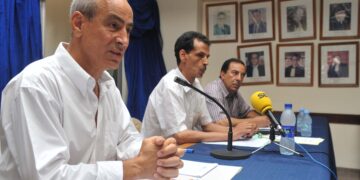U.S. citizen Saad Almadi imprisoned for critical tweets unable to return home due to travel ban
(Washington, DC, March 21, 2023) Saudi Arabia should immediately lift a travel ban it has reportedly imposed on Mr. Saad Almadi, a 72-year-old U.S. citizen whom they released yesterday from prison in Riyadh, and allow him to return to the United States, said Democracy for the Arab World Now (DAWN). The Saudi Specialized Criminal Court had sentenced Mr. Almadi on October 3, 2022, to 16 years in prison for tweets critical of the Saudi government, increased to 19 years by the Saudi Court of Appeals in February 2023.
"We welcome news that Saudi Arabia has dropped all charges against Mr. Almadi and released him from his unjust imprisonment. However, we are concerned that he remains effectively imprisoned in the country pursuant to a travel ban," said Sarah Leah Whitson, DAWN's Executive Director. "The Biden administration's responsibility for Almadi's safety and security will be relieved only when Almadi is safe and secure at home with his family in the United States."
The Specialized Criminal Court sentenced Mr. Amadi, a retired engineer from Saudi Arabia who moved to the United States in the 1970s, to 16 years in prison for tweets mildly critical of the Crown Prince of Saudi Arabia. Saudi security authorities detained him during a November 2021 trip he took to Saudi Arabia for a personal visit. Although released from prison yesterday, his family stated that Mr. Almadi is not able to come back to his home in the United States due to a travel ban Saudi authorities have imposed on him as part of his original sentence. It is not clear, however, if the Saudi court has vacated his entire verdict, including the travel ban it included, in light of reports that it has dropped the charges against him.
DAWN worked closely with Almadi's family to advocate for his release, meeting with Congress and officials from the State Department, including the Office of the Special Presidential Envoy for Hostage Affairs (SPEHA). DAWN had recently urged the State Department to designate him as a wrongfully detained U.S. citizen under the Robert Levinson Hostage Recovery and Hostage–Taking Accountability Act. State Department officials told DAWN that they were seriously considering the case for the wrongful detention designation.
"We believe that the State Department was on the verge of designating Mr. Almadi as a 'wrongfully detained' US citizen, which would have required the U.S. government to step up the efforts to recover him as an American hostage, as well as imposing sanctions against individuals or entities responsible for holding him," said Raed Jarrar, DAWN's Advocacy Director. "All you need to know about the arbitrary and capricious nature of the Saudi judiciary and its existence as a tool of MBS' political games is the speed with which it sentenced him for an outrageous 19 years, and then just as speedily released him without comment."
Congress passed the Levinson Act, also known as the Robert Levinson Hostage Recovery and Hostage-Taking Accountability Act, in 2015 to provide resources to the U.S. government to recover American citizens who are wrongfully detained or taken hostage abroad. The act provides for the establishment of an interagency Hostage Recovery Fusion Cell based at the headquarters of the Federal Bureau of Investigation (FBI) to coordinate efforts to recover American hostages, as well as for the imposition of sanctions against individuals or entities responsible for taking or holding American hostages.
If the Hostage Affairs Office of the State Department had designated Almadi as "wrongfully detained," he would have been eligible for certain protections and resources under the Levinson Act. The U.S. government would have been required to provide assistance to Mr. Almadi and his family, including efforts to secure his release and provide support while he was detained. The Act also provides for financial assistance to families of wrongfully detained individuals, as well as for the imposition of sanctions against individuals or entities responsible for the detention.
"The release of U.S. citizen Almadi is a step in the right direction, but there are so many people who remain imprisoned in Saudi Arabia merely for exercising their right to freedom of expression," said Sevag Kechichian, DAWN's Gulf Researcher. "The Saudi authorities must release all individuals who are unjustly detained."




































